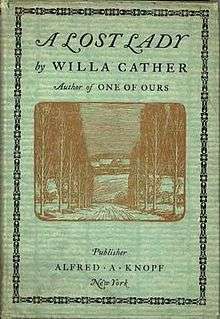A Lost Lady
 First edition | |
| Author | Willa Cather |
|---|---|
| Country | United States |
| Language | English |
| Publisher | Alfred A. Knopf |
Publication date | September 1923 |
| Media type | Print (Hardback) |
Willa Cather's A Lost Lady was first published in 1923. It tells the story of Marian Forrester and her husband, Captain Daniel Forrester who live in the Western town of Sweet Water, along the Transcontinental Railroad.
Plot summary
The novel is written in the third person, but is mostly written from the perspective of Niel Herbert, a young man who grows up in Sweet Water and witnesses the decline of Mrs. Forrester, for whom he feels very deeply, and also of the West itself from the idealized age of noble pioneers to the age of capitalist exploitation.
Characters in "A Lost Lady"
Mrs. Marian Forrester: The wife of Captain Forrester, she is a small town aristocrat. Niel falls in love with what she represents, and is dismayed to discover that she has a lover, Frank Ellinger. After her husband's death she allows Ivy Peters to run her estate. She eventually leaves the town and marries an Englishman, dying before Niel ever sees her again.
Captain Daniel Forrester: A strong man who made his fortune building track for the railroads in the old pioneering days. He is proud of his beautiful wife. The novel opens at a time when he has already been physically destroyed by a fall from a horse. After suffering two strokes he eventually dies, signifying the end of the pioneering era.
Niel Herbert: The main character, Niel is a young boy when he meets Mrs. Forrester. He falls in love with what she represents and struggles to preserve his boyhood image of her. After watching her first have an affair with Frank Ellinger and later Ivy Peters, he finally gives up on her. Niel realizes by the end of the novel that his perception of Mrs. Forrester is based on the Captain's influence over her.
Judge Pommeroy: Niel's uncle, he is a lawyer that falls on hard times much the way the Forresters do.
Ivy Peters: An elder boy who knocks down a woodpecker and slits her eyes before releasing her. He is cocky and pretentious and becomes a lawyer. Later in the novel he becomes very wealthy and eventually he succeeds in owning the Forrester estate.
Frank Ellinger: A large man, he is a bachelor at the beginning. Frank is Mrs. Forrester's lover and visits her when the Captain is away from the house. He later marries Constance Ogden.
Constance Ogden: A girl Niel's age whom he tries to entertain at the Forresters, she later marries Frank Ellinger.
Black Tom: Judge Pommeroy's black servant, he often works for the Forresters as well.
Adolph Blum: One of Niel's friends, he accidentally comes across Mrs. Forrester and Frank Ellinger in the cedar grove.
Cyrus Dalzell: The president of the Colorado and Utah and a good friend of the Forrester family.
Mrs. Beasley: The town phone operator, she listens in on all long distance calls.
Literary significance and criticism
The novel is regarded as having a robust symbolic framework.
Allusions/references from other works
The novel is also regarded as having been an influence on F. Scott Fitzgerald, as Marian Forrester was an inspiration for his Daisy Buchanan character in The Great Gatsby.
Film, TV or theatrical adaptations
The first film version of the novel was created in 1924, adapted by Dorothy Farnum. Directed by Harry Beaumont, it starred Irene Rich, Matt Moore, June Marlowe, and John Roche.[1] It would also be adapted very loosely into a film of the same name in 1934 by Gene Markey, and starred Barbara Stanwyck as Marian Forrester. The film did not live up to the novel's reputation and is generally regarded as mediocre.[2]
References
- ↑ "A Lost Lady". American Film Institute. Retrieved January 2, 2015.
- ↑ "A Lost Lady". American Film Institute. Retrieved January 2, 2015.